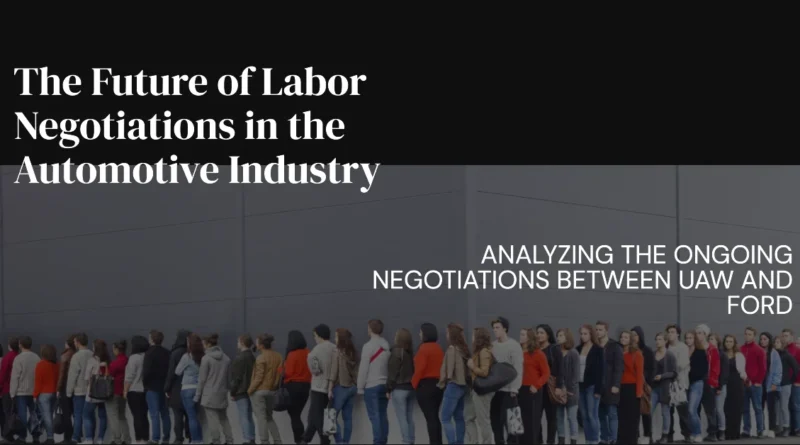Labor Negotiations in the Automotive Industry: UAW, Ford, and the Road Ahead
It’s United Auto Workers vs Ford Motor Company
The automotive industry is no stranger to headlines filled with discussions of labor negotiations, strikes, and contracts. In recent times, the United Auto Workers (UAW) union and Ford Motor Company have been at the forefront of these discussions. Let’s delve into the key developments, challenges, and outcomes of these labor negotiations, shedding light on their impact on the automotive industry.
The United Auto Workers (UAW)
The UAW, short for the United Auto Workers, is a prominent North American industrial union representing automotive and other vehicular workers. Headquartered in Detroit, Michigan, the birthplace of the U.S. automotive industry, the UAW plays a vital role in safeguarding the rights and welfare of workers in this sector.
| Founded | Headquarters | Membership |
| 1935 | Detroit, MI | Over 400,000 active members |
Ford Motor Company
Ford Motor Company, often referred to as Ford, is one of the most iconic names in the global automotive industry. Founded by Henry Ford in 1903, this American multinational automaker has a rich history and a significant presence worldwide.
| Founded | Headquarters | Revenue (2022 Q2) |
| 1903 | Dearborn, MI | $36.5 billion |
Recent Developments
UAW’s Counterproposal to Ford
In 2023, the UAW made headlines by presenting a labor contract counterproposal to Ford Motor Company. This move is part of the ongoing negotiations between the union and the automaker. These negotiations encompass various economic issues crucial to both parties, such as wages, benefits, working conditions, and job security.
The UAW’s counterproposal represents the collective voice of its members, who seek fair and equitable terms that reflect their contributions to the company’s success.
The Looming Strike Threat
While negotiations continue, the automotive industry faces the specter of potential strikes. The UAW has not only engaged with Ford but has also raised concerns about possible strikes against General Motors (GM) and Stellantis, two other major players in the industry.
Prolonged strikes against these automotive giants would be unprecedented and could have far-reaching consequences. It would disrupt not only the operations of these companies but also the intricate automotive supply chain. Such disruptions would ripple through the broader U.S. economy, affecting countless jobs and industries.
Ford’s Strong Financial Performance
Amidst the backdrop of labor negotiations and potential strikes, Ford Motor Company reported a robust financial performance. In the second quarter of 2023, Ford exceeded expectations by achieving a net income of $1.9 billion. This impressive figure showcases the company’s resilience and adaptability in a dynamic and competitive industry.
| Quarter | Net Income |
| 2023 Q2 | $1.9 billion |
| 2022 Q4 | $2.6 billion |
| 2022 Q3 | $1.9 billion |
The Impact on the Automotive Industry
The developments surrounding the UAW’s negotiations with Ford and other major automakers carry significant implications for the entire automotive industry.
Labor Relations and Worker Welfare
At its core, these negotiations underscore the importance of labor unions like the UAW in advocating for the rights and well-being of workers. Labor unions play a pivotal role in ensuring fair wages, safe working conditions, and job security for their members. They strive to strike a balance between the interests of the workforce and the sustainability of the industry.
Supply Chain Vulnerabilities
The possibility of strikes in major automotive companies, such as Ford, GM, and Stellantis, highlights the vulnerabilities in the global automotive supply chain. Disruptions in the supply chain can lead to delays in production, affecting not only the automakers but also suppliers, dealerships, and consumers. Such disruptions can have a cascading effect, impacting various industries beyond the automotive sector.
Financial Performance and Industry Resilience
Ford’s strong financial performance amidst negotiations reflects the company’s ability to navigate challenges effectively. It demonstrates the adaptability and innovation within the automotive industry. As automakers continue to invest in electric and autonomous vehicles, their financial strength becomes essential for driving technological advancements.
Conclusion
Labor negotiations in the automotive industry are not just about contracts and strikes; they are a reflection of the delicate balance between the interests of workers and the sustainability of a crucial sector. The UAW’s efforts in negotiations with Ford Motor Company and others illustrate the ongoing struggle to ensure fair treatment and secure livelihoods for automotive workers.
As the industry evolves, with a growing focus on sustainability and innovation, labor relations will remain a central theme. The ability of automakers, unions, and stakeholders to collaborate and adapt will shape the future of the automotive industry, ensuring it remains a driving force in the global economy.




